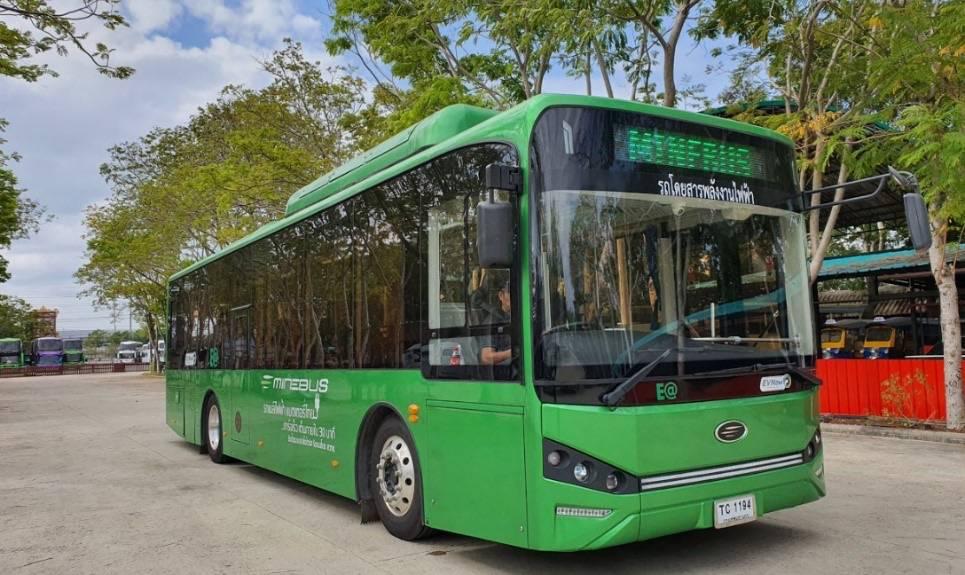Efforts to reduce carbon dioxide emissions in Thailand are gaining momentum as the government and businesses step up projects to develop clean energy.

An electric bus developed by EA. The company jointly runs a project to sell carbon credits from battery-powered buses in Bangkok and surrounding provinces to the Switzerland-based Klik Foundation.
Using more renewable fuel sources to generate electricity and government promotion of electric vehicles (EVs) are among a variety of efforts to create new businesses, driven by a commitment to care. more to the environment.
Companies that are not eco-conscious may face penalties, while those that seek to limit environmental damage may gain certain advantages.
Among the penalties is the Carbon Border Adjustment Mechanism (CBAM), initiated by the EU that imposes fees on producers who do not follow practices that are less harmful to the environment.
Since CBAM is an EU law, it mainly affects Thai export products.
Two economic tools -- carbon credits and renewable energy certificates -- along with clean energy projects are providing gentler ways to combat global warming.

Egat's floating solar farm, with a capacity of 45MW, is located in a reservoir at Sirindhorn Dam in Ubon Ratchathani province. The company will continue to generate renewable energy for its REC commercial.
TRADE CARBON
Business operators are commercializing efforts to reduce carbon dioxide emissions by trading carbon credits.
Carbon credit transactions allow companies to sell carbon credits from reduced emissions to other organizations that want to reduce emissions but are unable to meet their reduction goals.
The term carbon credit refers to reduced carbon dioxide emissions through environmental projects, including clean energy development. This amount can be sold to other companies to offset the amount of carbon dioxide they release into the atmosphere.
SET Energy Absolute (EA), a developer and operator of renewable energy and EVs, is among the companies benefiting from clean energy and EV projects.
The company operates wind and solar farms with a total generating capacity of 278 megawatts. This allows EA to sell carbon credits, amounting to 4.35 million tonnes of carbon dioxide equivalent (tCO2e) per year, said Vasu Klomkriang, EA's senior vice president of investment planning.
He said that in 2021, the company has been certified under Thailand's Voluntary Emission Reduction Scheme (T-VER) to sell 794,151 tons of CO2e.
EA is a member of T-VER, which was initiated in 2014 by the Thai Greenhouse Gas Management Organization, a public organization set up to encourage government agencies and companies to voluntarily reduce their greenhouse gas emissions. Greenhouse.
Last year, EA signed an agreement to sell carbon credits from its battery-powered buses to the Switzerland-based Climate Protection and Carbon Offsets, widely known as the Klik Foundation.
The project, co-developed by EA and South Pole Co, promotes the use of electric buses in Bangkok and surrounding provinces to replace buses powered by diesel or compressed natural gas.

Developing waste into energy is one of the renewable energy projects that Absolute Clean Energy wants to emphasize.
The number of carbon credits sold to the Klik Foundation was not disclosed.
The EA says the carbon credits from this project will support Bern's campaign to cut greenhouse gas emissions in the country by 30% by 2030 from levels recorded in 1990.
This form of carbon credit trading is part of an international effort to reduce greenhouse gas emissions under Article 6 of the Paris Agreement, encouraging participating countries to work together to combat global warming.
EA assembles electric buses at its factory in Chachoengsao.
Sompote Ahunai, chief executive officer of EA, said the company is focused on developing commercial electric vehicles because buses, boats and trucks have large bodies that require large amounts of diesel to power their engines. their internal combustion.
Diesel engines emit carbon dioxide and as they age become the main source of PM2.5 dust, this very fine dust can easily get into the lungs of people, making it difficult to breathe.
Another company interested in carbon credit trading is Shigang Green Energy (TGE), the developer and operator of a biomass power plant.
Sakda Siriphatsophon, chief executive officer of TGE, said late last year the company announced a 9.9MW power plant operated by its subsidiary Thachang Power Green Co, which has a credit of up to 33,964 tonnes of CO2e per year. certified by the Thai Greenhouse Gas Management Organization.






